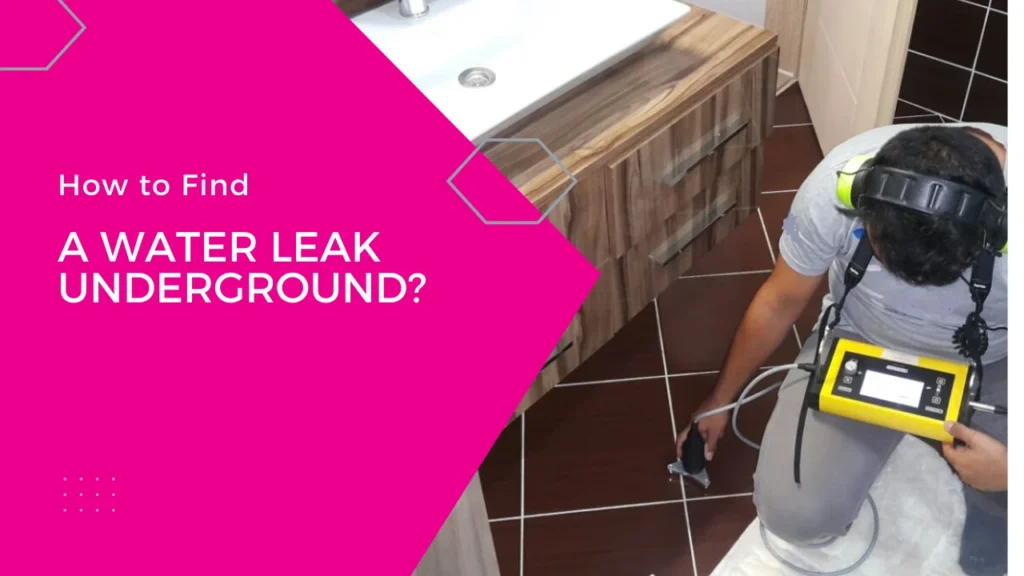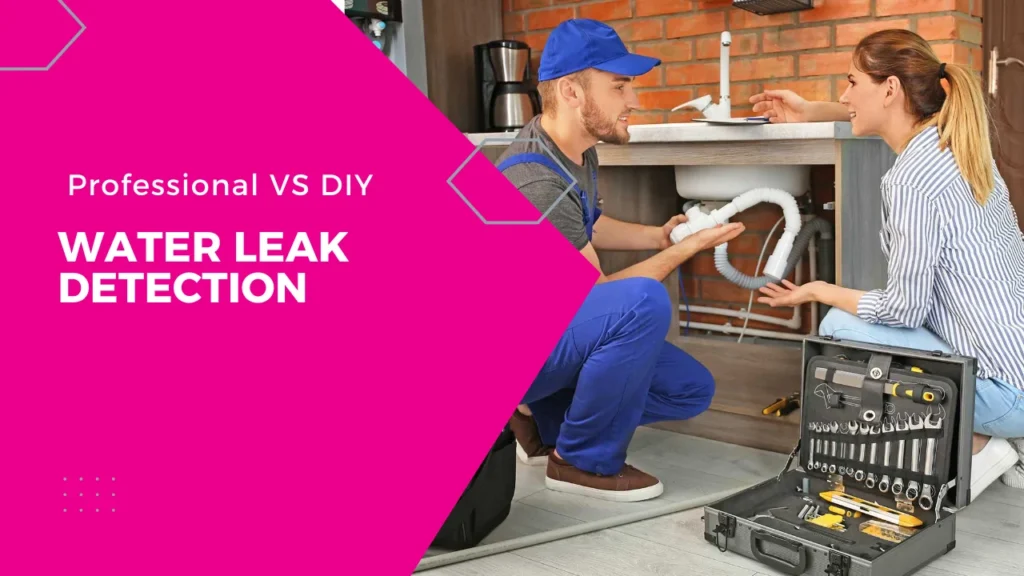Why Underground Leaks Matter More Than You Think?
Underground water leaks are among the most elusive and costly plumbing issues. They can silently erode your foundation, inflate your water bill, and damage landscaping—often without any visible signs.
Whether you’re a homeowner in Pompano Beach, a property manager in South Florida, or simply someone noticing suspicious moisture, this guide will help you detect, diagnose, and resolve underground leaks using both DIY methods and advanced technologies.
Why Underground Leaks Are a Hidden Threat?
Unlike visible pipe bursts or dripping faucets, underground leaks occur beneath soil, concrete, or flooring—making them harder to detect and more expensive to repair. Left unchecked, they can:
- Cause foundation instability and structural damage
- Lead to mold growth and indoor humidity issues
- Waste thousands of gallons of water monthly
- Attract pests due to moist environments
- Trigger sinkholes or soil erosion in extreme cases
If you’re located in Oakland Park and suspect a hidden leak, our Oakland Park water leak detection specialists offer fast, non-invasive solutions tailored to your neighborhood’s plumbing infrastructure.
Early Signs of an Underground Water Leak
Before you call a plumber, look for these common indicators:
1. Unexplained Spike in Water Bills
If your usage habits haven’t changed but your bill has doubled, a leak may be lurking underground.
2. Soggy or Overly Green Patches in Your Yard
Localized lush growth or wet soil can signal water escaping below the surface.
3. Hissing, Bubbling, or Running Water Sounds
Listen near walls, floors, or outdoor spigots—especially at night when ambient noise is low.
4. Cracks in Foundation or Driveway
Water undermines structural integrity, causing visible shifts or cracks.
5. Musty Odors or Mold Growth
Persistent dampness from hidden leaks can lead to fungal infestations.
DIY Leak Detection Techniques
While professional tools offer precision, homeowners can perform basic checks to confirm suspicions.
Water Meter Test
- Turn off all water-using appliances.
- Locate your water meter (usually near the curb).
- Observe the leak indicator—a small dial or triangle.
- If it moves while water is off, you likely have a leak.
Visual Yard Inspection
Walk your property and look for:
- Muddy patches or pooling water
- Unusual plant growth
- Depressions or soft spots in soil
Dye Test for Toilets & Appliances
Add food coloring to the toilet tank. If color appears in the bowl without flushing, the flapper valve is leaking. While not underground, it’s a common source of water loss.
Advanced Leak Detection Technologies
Professional plumbers use cutting-edge tools to pinpoint underground leaks without excavation.
Acoustic Leak Detection
Acoustic leak detection uses specialized listening devices to pick up the subtle sounds of water escaping from buried pipes. These acoustic sensors are incredibly effective in pinpointing leaks beneath concrete, soil, or flooring—especially when visual signs are absent. For homeowners and businesses in Fort Lauderdale, our local leak detection team uses advanced acoustic and thermal tools to pinpoint underground leaks—without tearing up your property.
Infrared Thermal Imaging
Infrared thermal imaging is another powerful tool for detecting hidden water leaks. By capturing temperature differences caused by moisture, it can reveal leaks under concrete slabs or behind walls—without any demolition.
Tracer Gas Detection
When traditional methods fall short, tracer gas leak detection offers a highly accurate, non-invasive solution. This technique involves introducing a safe, odorless gas—typically a hydrogen-nitrogen blend—into the plumbing system. Because the gas molecules are smaller than water, they escape through even the tiniest cracks or pinholes in underground pipes.
Ground Penetrating Radar (GPR)
Ground Penetrating Radar (GPR) offers a non-invasive way to map underground pipes and detect leaks. It’s especially useful for properties with paved surfaces or complex landscaping, where digging isn’t an option.
Satellite-Based Leak Detection (SAR)
For large-scale properties or municipal systems, satellite leak detection is emerging as a game-changer. Using remote sensing technology, it identifies moisture anomalies across vast areas—ideal for spotting underground plumbing issues before they escalate.
If you’re noticing soggy patches or rising water bills in Pompano Beach, explore our specialized leak detection services designed for coastal soil conditions and slab foundations.
Common Causes of Underground Water Leaks
Understanding the root cause helps prevent future issues.
Tree Root Intrusion
Roots seek moisture and can penetrate pipe joints, causing cracks or blockages.
Pipe Corrosion
Older pipes made of galvanized steel or copper may corrode due to soil acidity or electrolysis.
Poor Installation
Improper bedding, joint sealing, or pipe alignment can lead to premature failure.
Ground Movement
Soil shifting due to construction, seismic activity, or erosion can stress pipes.
High Water Pressure
Excessive pressure can rupture underground lines, especially in older systems.
What to Do If You Suspect a Leak?
- Run a water meter test to confirm leakage.
- Document symptoms with photos and timestamps.
- Call a licensed plumber with leak detection equipment.
- Avoid DIY digging—you may damage utilities or worsen the leak.
Whether you’re in Broward, Palm Beach, or Miami-Dade, our South Florida leak detection experts are available 24/7 to locate and repair leaks before they cause major damage.
Pro Tip: Want quick tips on spotting hidden leaks before they escalate? Check out our latest Google Business post for homeowner-friendly advice and real-time updates from our field team.
Local Expertise You Can Trust in South Florida
At Priscilla’s Plumbing, we specialize in non-invasive underground leak detection across Pompano Beach, Fort Lauderdale, and surrounding areas. Our certified technicians use:
- Acoustic sensors
- Thermal imaging
- Tracer gas systems
- GPR and pipe locators
Curious whether you should tackle leak detection yourself or call a pro? Our in-depth comparison guide breaks down the pros, cons, and costs of each approach.We offer same-day service, transparent pricing, and guaranteed repairs. Whether it’s a hidden leak under your lawn or a burst pipe beneath your driveway, we’ll find it fast—without unnecessary digging.
If you’re dealing with a burst pipe or sudden flooding, don’t wait—our emergency plumbing team is available 24/7 to respond within 45 minutes across South Florida.📞 Call us now at (954) 787-2052 or book online for expert leak detection.
FAQs
Q1. Can I detect a leak without tearing up my yard?
Yes. Acoustic sensors, infrared cameras, and GPR allow non-invasive detection.
Q2. How much does underground leak detection cost?
Expect $150–$500 depending on property size, pipe depth, and detection method.
Q3. Are underground leaks covered by insurance?
Some policies cover sudden damage, but not gradual wear. Check your provider’s terms.
Q4. What’s the cheapest way to find a leak?
Start with a water meter test and visual inspection. If signs persist, hire a plumber with acoustic tools.
Q5. Can underground leaks affect my neighbor’s property?
Absolutely. Water migration can impact adjacent foundations, driveways, or landscaping.








